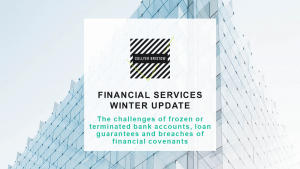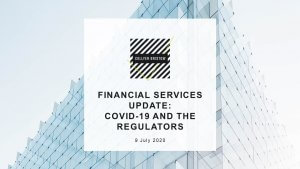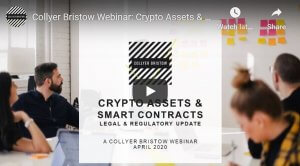- Banking & financial disputes
- Financial services

Shorter Reads
Bank Fraud: Safeguards and Solutions (part two)
In last week’s article, Bank Fraud: Safeguards and Solutions (part one), we looked at what mechanisms the banks should have in place to protect their customers from fraud. This week we are looking at two potential courses of action available to individuals and businesses which have been victims of fraud.
1 minute read
Published 21 April 2020
Key information
Quincecare duty
Banks are under a duty not to execute payment instructions where they have reasonable grounds to believe that the instruction is an attempt to misappropriate the customer’s funds (being put on inquiry); this is known as a bank’s Quincecare duty. Where a bank fails to protect its customer’s funds in this way, the customer may have a claim to recover the misappropriated funds from the bank for breach of the Quincecare duty.
The Quincecare duty is a valuable protection for customers which a bank cannot exclude without using very clear wording in its contract with the customer. However, what it will look like for a bank to be put on inquiry will vary depending on the circumstances, for example, it may be reasonable to find that it would take less for a smaller private bank to be put on inquiry than a major clearing bank with millions of transactions to process on a daily basis. Customers can also be found to have been contributorily negligent in allowing the fraud to occur, meaning that the damages awarded by the Court may be reduced.
You can read more about the application of the Quincecare duty here.
Freezing and disclosure orders
Upon discovery of a fraud, the victim can apply to Court for a freezing order against the account(s) to which the misappropriated funds have been transferred. This prevents the accountholder(s) from dealing with the funds until the order has been lifted. At the same time, the victim can apply for a disclosure order to require the accountholder to provide details of their assets and/or any onward transfers as appropriate. If the funds have already been spent then it might be possible to obtain a proprietary freezing order against the assets which have been purchased with the funds.
In circumstances like these it is essential that the victim of a fraud acts quickly to locate where the funds have been transferred to as it is common for the money to be transferred rapidly through multiple accounts in various jurisdictions. The longer the victim takes to act, the harder it will be to regain their stolen money.
There is also a risk that the funds will be transferred to a party who is unaware of the fraud, for example, where the fraudster has used the stolen money to pay the fees of a professional adviser. In such cases it is often not possible to recover the money as the party in question has received the funds for value and without notice of any dispute, that is to say that they received the funds in payment for a legitimate service which they provided and they could not have been expected to know the funds were obtained fraudulently. In such instances, they can, however, still be required to provide information in compliance with a disclosure order in case they are able to provide any further details which may be useful in obtaining an award against the fraudsters themselves.
For more information or advice on what to do in the event of fraud, please contact a member of our Banking & financial disputes team.
Related content
Shorter Reads
Bank Fraud: Safeguards and Solutions (part two)
In last week’s article, Bank Fraud: Safeguards and Solutions (part one), we looked at what mechanisms the banks should have in place to protect their customers from fraud. This week we are looking at two potential courses of action available to individuals and businesses which have been victims of fraud.
Published 21 April 2020
Associated sectors / services
Authors
Quincecare duty
Banks are under a duty not to execute payment instructions where they have reasonable grounds to believe that the instruction is an attempt to misappropriate the customer’s funds (being put on inquiry); this is known as a bank’s Quincecare duty. Where a bank fails to protect its customer’s funds in this way, the customer may have a claim to recover the misappropriated funds from the bank for breach of the Quincecare duty.
The Quincecare duty is a valuable protection for customers which a bank cannot exclude without using very clear wording in its contract with the customer. However, what it will look like for a bank to be put on inquiry will vary depending on the circumstances, for example, it may be reasonable to find that it would take less for a smaller private bank to be put on inquiry than a major clearing bank with millions of transactions to process on a daily basis. Customers can also be found to have been contributorily negligent in allowing the fraud to occur, meaning that the damages awarded by the Court may be reduced.
You can read more about the application of the Quincecare duty here.
Freezing and disclosure orders
Upon discovery of a fraud, the victim can apply to Court for a freezing order against the account(s) to which the misappropriated funds have been transferred. This prevents the accountholder(s) from dealing with the funds until the order has been lifted. At the same time, the victim can apply for a disclosure order to require the accountholder to provide details of their assets and/or any onward transfers as appropriate. If the funds have already been spent then it might be possible to obtain a proprietary freezing order against the assets which have been purchased with the funds.
In circumstances like these it is essential that the victim of a fraud acts quickly to locate where the funds have been transferred to as it is common for the money to be transferred rapidly through multiple accounts in various jurisdictions. The longer the victim takes to act, the harder it will be to regain their stolen money.
There is also a risk that the funds will be transferred to a party who is unaware of the fraud, for example, where the fraudster has used the stolen money to pay the fees of a professional adviser. In such cases it is often not possible to recover the money as the party in question has received the funds for value and without notice of any dispute, that is to say that they received the funds in payment for a legitimate service which they provided and they could not have been expected to know the funds were obtained fraudulently. In such instances, they can, however, still be required to provide information in compliance with a disclosure order in case they are able to provide any further details which may be useful in obtaining an award against the fraudsters themselves.
For more information or advice on what to do in the event of fraud, please contact a member of our Banking & financial disputes team.
Associated sectors / services
- Banking & financial disputes
- Financial services
Authors
Need some more information? Make an enquiry below.
Subscribe
Please add your details and your areas of interest below
Article contributor
Helen
IngramAssociate
Specialising in Commercial, Corporate and Corporate recovery, restructuring & insolvency
Enjoy reading our articles? why not subscribe to notifications so you’ll never miss one?
Subscribe to our articlesMessage us on WhatsApp (calling not available)
Please note that Collyer Bristow provides this service during office hours for general information and enquiries only and that no legal or other professional advice will be provided over the WhatsApp platform. Please also note that if you choose to use this platform your personal data is likely to be processed outside the UK and EEA, including in the US. Appropriate legal or other professional opinion should be taken before taking or omitting to take any action in respect of any specific problem. Collyer Bristow LLP accepts no liability for any loss or damage which may arise from reliance on information provided. All information will be deleted immediately upon completion of a conversation.
Close









































































